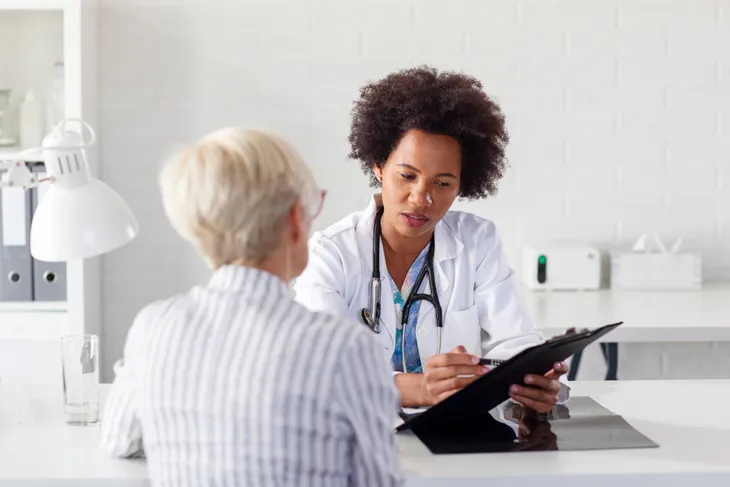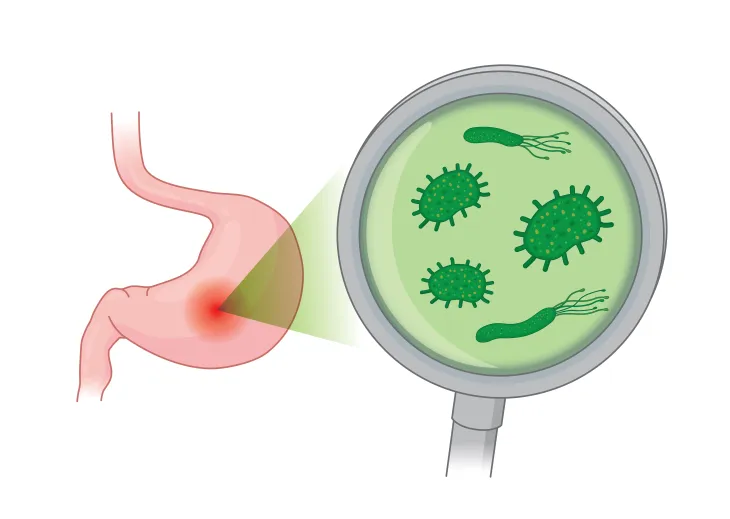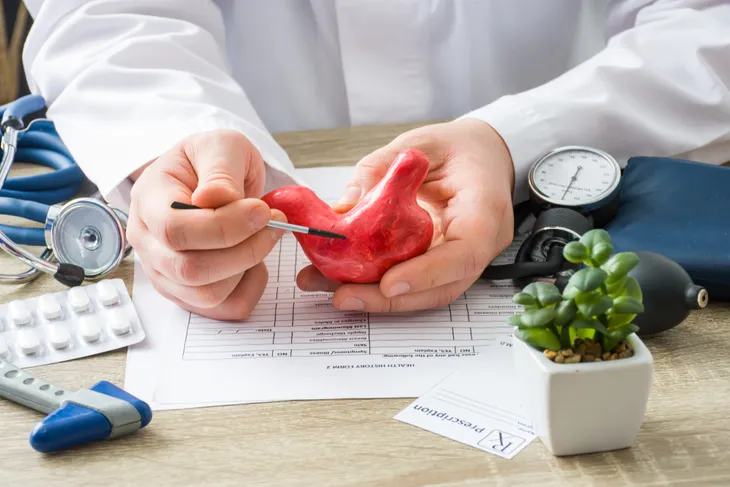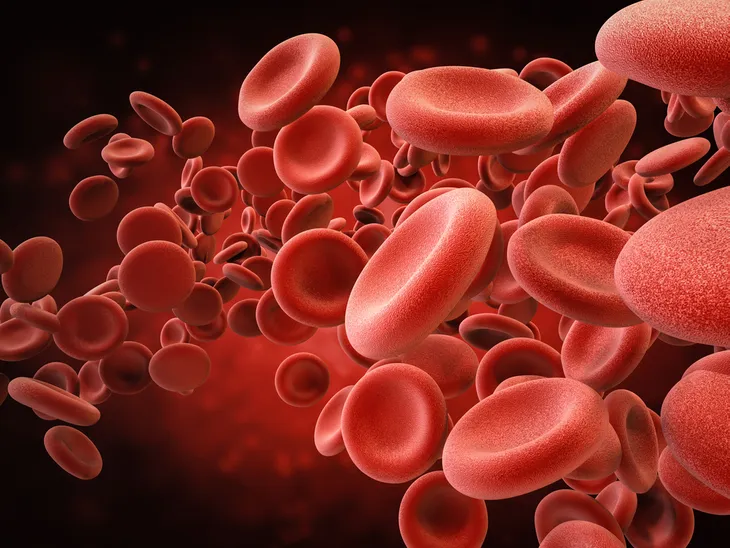- Stomach cancer grows on the inner lining of the stomach and is known as the 15th most common type of cancer.
- Symptoms don’t usually develop until the cancer is in an advanced stage.
- Age, gender, diet, and a previous stomach surgery can increase your risk.
- Chemotherapy, radiation therapy, surgery, and immunotherapy are possible treatment options but ultimately, your doctor will determine the best treatment for you.
Stomach cancer, also known as gastric cancer, is a type of cancer that grows on the inner lining of the stomach. According to the National Cancer Institute, it’s the 15th most common type of cancer, accounting for 26,560 new cases in 2021.
We are here to help you learn more about stomach cancer, including its common symptoms, causes, risk factors, and treatment options. With more information, you’ll be able to navigate more easily through your or your loved one’s diagnosis.
What Is Stomach Cancer?
Stomach cancer generally slowly develops over the course of a few years. Since the changes are slow there may not be any symptoms early on. This makes it difficult to catch stomach cancer early.
“Most cancers of the stomach (about 90% to 95%) are adenocarcinomas. These cancers develop from the gland cells in the innermost lining of the stomach (the mucosa),” reports the American Cancer Society.
Symptoms of Stomach Cancer
Unfortunately there usually aren’t many early symptoms of stomach cancer. This can lead to people finding out that they have the disease only once it’s in an advanced stage. Here are some of the most common symptoms of advanced stomach cancer:
- Loss of appetite
- Heartburn
- Nausea and vomiting
- Bloody stools
- Bloating
- Stomach pain
- Fatigue
- Jaundice
It’s important to note, that these symptoms are common with numerous other conditions and if you have one or more of the symptoms it does not mean you have stomach cancer. Always talk to your doctor with any concerns you have to help determine the right course for you.
Risk Factors for Stomach Cancer
Age and Gender
When you look at risk factors, there are two different categories. The first is modifiable, these risk factors you can change such as quitting smoking. The other type is non-modifiable, these are risk factors that you cannot change like your age and gender.
When it comes to stomach cancer men are more likely than women to develop the disease, says the American Cancer Society. It’s also more common the older you get. It is diagnosed more in people in their 60s, 70s, and 80s says the source.
H. Pylori Infection
Helicobacter pylori, also called H. pylori, is a bacteria that is linked to increased rates of stomach cancer. “Infection with Helicobacter pylori (H. pylori) bacteria seems to be a major cause of stomach cancer, especially cancers in the lower (distal) part of the stomach,” says the American Cancer Society. If you have a long-term H. pylori infection it can cause atrophic gastritis and changes to the inner lining of the stomach, say the source.
While this infection is associated with higher rates of H. pylori it does not mean you will get stomach cancer. If you have a history of H. pylori infection or suspect you may currently be infected talk to your doctor to determine the next steps
Diet
What you eat can impact your chances of developing stomach cancer. If you consume a lot of foods preserved with salt, processed foods, or grilled meats there is an increased risk of non-cardia stomach cancers. There is also an increased risk for those who do not eat many (or any) fruits.
The American Cancer Society reports that “Being overweight or obese is linked with an increased risk of cancers of the cardia (the upper part of the stomach near the esophagus).” It’s clear that what you eat has a big impact on your likelihood of developing stomach cancer. Work to adjust your diet if necessary and reach out to a dietician if you need help.
Smoking
It turns out nothing good comes from smoking. It not only wreaks havoc on your lungs it also increases your “stomach cancer risk, particularly for cancers of the upper part of the stomach near the esophagus. The rate of stomach cancer is about doubled in people who smoke,” says the American Cancer Society.
If you smoke or use tobacco now is the time to stop. We know it’s much easier said than done. If you need help quitting your doctor can help. There are medications and therapies available to ease your addiction.
Stomach Surgery
Another risk factor for stomach cancer is stomach surgery. If you have had part of your stomach removed to treat an ulcer or another non-cancerous disease you may have a higher risk of stomach cancer. “This might be because the stomach makes less acid, which allows more harmful bacteria to be present,” says the American Cancer Society.
That’s not the only theory. Reflux from the small intestine into the stomach after surgery can also increase your risk. Since these cancers are found many years after the surgery it can be hard to identify the cause.
Pernicious Anemia
There are cells in the stomach that make something called intrinsic factor (IF). Your body needs IF to absorb vitamin B12 from foods. People who suffer from a vitamin B12 deficiency are not able to make enough red blood cells and may have other problems. This is called pernicious anemia and can be caused by some autoimmune conditions and some kinds of stomach surgery.
People with pernicious anemia not only have low red blood cells but are also at an increased risk of developing stomach cancer.
Treatment
Chemotherapy
Chemotherapy is a medication that is given as a pill or in the vein through an IV or central line. It can be used to treat stomach cancer in different ways. A patient may have chemo before surgery to shrink the tumor or have chemo after surgery to ensure all the cancer is destroyed.
Chemo works by attacking and destroying the cells in the body that divide quickly. This can lead to some bad side effects like nausea, vomiting, mouth sores, hair loss, and much more.
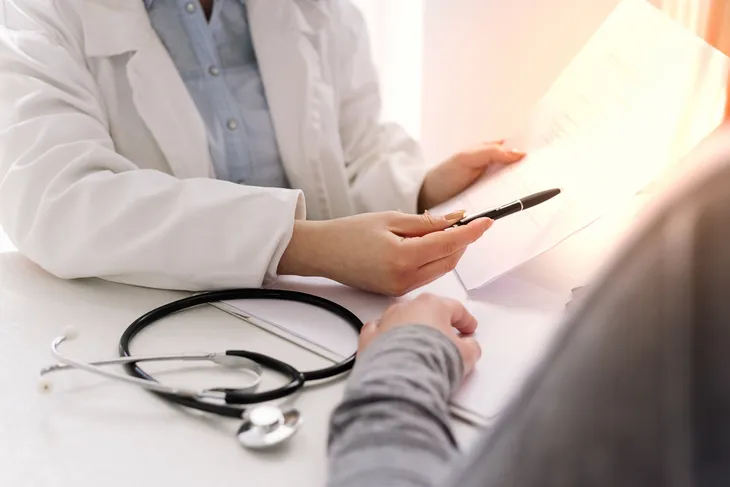 novak.elcic / Shutterstock
novak.elcic / ShutterstockRadiation Therapy
Radiation therapy uses high-energy rays focused on a specific spot of the body to destroy cancer cells. Like chemotherapy, radiation can be used before or after surgery to ensure all the cancer is destroyed. It can also be used when surgery isn’t an option to shrink the tumor.
Also like chemo, radiation has some unwanted side effects. You can have skin blisters, redness, fatigue, nausea, vomiting, or diarrhea.
Surgery
Surgery for stomach cancer aims to remove as much of the cancerous tumor as possible. It is not always possible to have surgery for stomach cancer, especially if the cancer has spread. There are several different approaches to stomach cancer surgery and surgery may be used in conjunction with other therapies like chemotherapy or radiation.
If you need stomach surgery ask your surgeon how much of the stomach will be removed. “Some surgeons try to leave behind as much of the stomach as they can, which might allow patients to eat more normally afterward. However, the main goal of surgery is to be sure all the cancer has been removed,” says the American Cancer Society.
Immunotherapy
Your immune system’s job is to keep you healthy and destroy invading cells. According to the American Cancer Society, “Immunotherapy is the use of medicines to help a person’s own immune system find and destroy cancer cells more effectively.”
Just like other treatments, there are side effects to immunotherapy. These include infusion reactions, fatigue, fever, cough, and nausea to name a few. There are several types of immunotherapy, your doctor will discuss which options are best for you and your situation.



